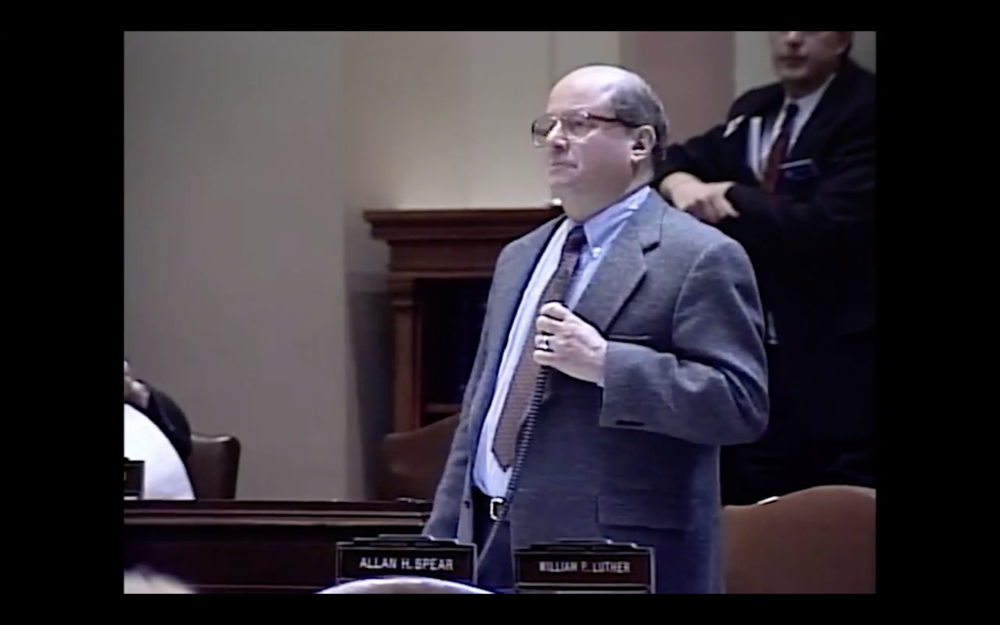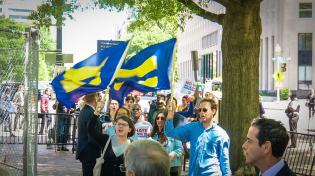800-800-0350
On April 2, 1993, Governor Arne Carlson signed legislation outlawing discrimination based on a person's sexual orientation, making Minnesota the eighth state to extend civil rights protections to the LGBTQ+ community—and the first state to include protections based on gender identity.
For more than two decades, working for the inclusion of LGBTQ+ Minnesotans into the the state's Human Rights Act was a priority for local organizers such as the Minnesota Committee for Gay Rights and Senator Allan Spear, Minnesota's first openly gay state legislator.
With an additional champion in Representative Karen Clark, efforts to pass the Human Rights Act amendment grew in the 1980s. The work of The Northstar Project in 1987 provided the first comprehensive survey of the Gay and Lesbian community in the Twin Cities, and was sponsored by the Gay and Lesbian Community Action Council (GLCAC, and precursor to OutFront Minnesota).
Governor Rudy Perpich's Task Force on Gay and Lesbian Minnesotans in 1990 further surveyed the LGBTQ+ community across the state, providing additional urgency for LGBTQ+ inclusion in the Human Rights Act.
With the additional support of community organizing through It's Time Minnesota, the amendment to the Minnesota Human Rights Act ultimately passed the Minnesota Senate and House in 1993.
In 2023, further changes to the Minnesota Human Rights Act updated language surrounding Sexual Orientation and Gender Identity—reflecting the growing diversity, vibrancy, and visibility of our community.
It's Time Minnesota
The movement to expand LGBTQ+ rights accelerated in the late 1980s. Following the repeal on St. Paul's non-discrimination act in 1978, activists sought to restore protections for LGBTQ+ community members. After a multi-year fight, sexual orientation was added back into St Paul's civil rights law in 1990, with a second repeal effort defeated in 1991.
A new lobbying group, It’s Time Minnesota, had grown out of this effort and organized broad popular support for expanding the Minnesota Human Rights Act to include sexual orientation and gender identity. The group enlisted labor unions, businesses, universities, and prominent civic groups like the League of Women Voters to reach new audiences—building pressure on state lawmakers to finally take action in 1993.

Allan Spear
Allan Henry Spear was the first openly gay man in the United States to serve as a state legislator. In 1993, he won a twenty-year fight to include the LGBTQ+ community in Minnesota's Human Rights Act.
Prior to the legislature, Spear was a professor of history at the University of Minnesota. First elected in 1972, Spear’s first draft of a gay rights bill failed to pass in 1975. He tried again in 1977 and again with Representative Karen Clark in 1981. Spear was not a single-issue senator and was also known for his work in judicial and criminal justice reform.
Spear retired from office in 2000 and served as a board member for the OutFront Minnesota PAC.
Karen Clark
Karen Clark was first elected to the Minnesota House of Representatives in 1980 and was re-elected every two years until retiring in 2018, one of the longest serving, openly LGBTQ+ legislators in U.S. history.
Clark was instrumental in getting landmark pieces of passed at the capitol, including the Minnesota Human Rights act in 1993 with Senator Allan Spear and same-sex marriage in 2013 with Senator Scott Dibble.
Further Reading
- Ehrenhalt, Lizzie. "Over the Rainbow: Queer and Trans History in Minnesota." MNopedia.org. May 25, 2021
- It's Time Minnesota, KTCA Reports, tpt, April 27, 1993. www.tpt.org/ktca-reports/
video/april-27-1993-16182/ - Milton, John. "20 years after Senate first tried, Minnesota Legislature finally gives gays civil rights protection." MinnPost. October 22, 2010.
- Nelson, Paul. "Minnesota Human Rights Act." MNopedia.org. February 2, 2023
- Preston, Joshua. "Senator Allan Spear and the Minnesota Human Rights Act." Minnesota History, Fall 2016.
- Rose, Katrina C. "Reflections at the Silver Anniversary of the First Trans-Inclusive Gay Rights Statute: Ruminations on the Law and its History -- and Why Both Should be Defended in an Era of Anti-Trans 'Bathroom Bills'," University of Massachusetts Law Review: Vol. 14: Iss. 1, Article 2.

